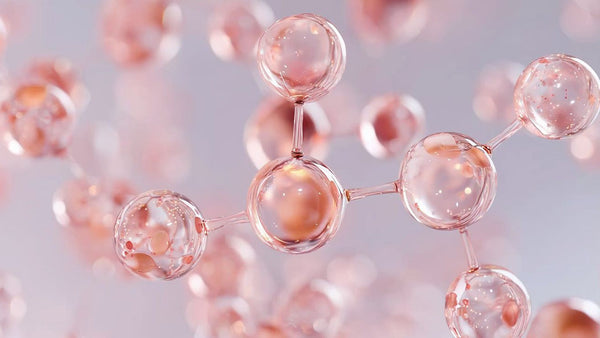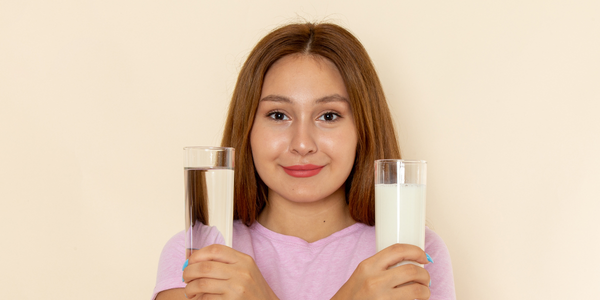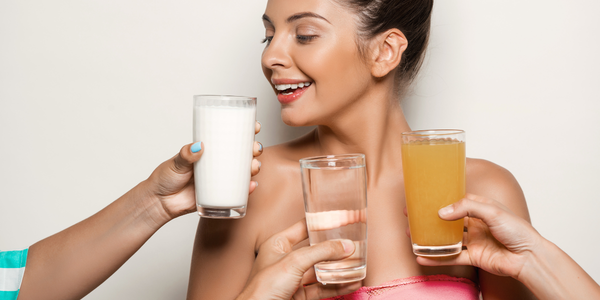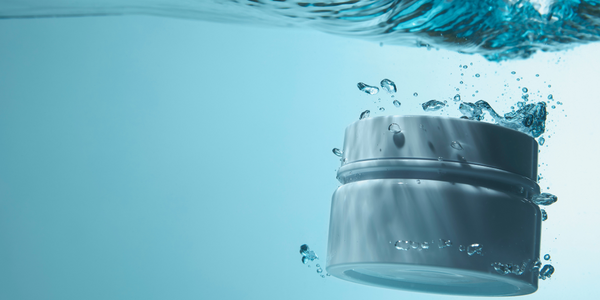You might be familiar with the term hyaluronic acid. Popular in the cosmetic industry, a lot of commercial skin and health products have been tapping the potential benefits of this hydrophilic liquid. Most commonly found in the skin, the vitreous humor of the eye, and the synovial fluids of the joints, Hyaluronic acid (HA) holds numerous benefits, such as lubricating and offering elasticity to your skin. It also relieves joint pain by lubricating them. Is there a hyaluronic acid diet? How do I get hyaluronic acid naturally? What is the best source of hyaluronic acid? Well, if you need answers to the above questions, read along. Below, we’ll talk about what hyaluronic acid is, which is the best hyaluronic acid, its benefits, and hyaluronic acid natural sources in the diet. Keep reading to get all the details on this must-have ingredient.
What is Hyaluronic Acid?
Hyaluronic acid occurs naturally in your body. It is a humectant (a substance that retains moisture) and is known for its moisture attraction and retention. It is capable of binding around 1,000 times more water than its weight. Hyaluronic acid helps your body with collagen synthesis, which further improves the texture of your skin.
What are the Benefits of Hyaluronic acid?
Hyaluronic acid benefits your body by promoting healthy-looking skin, relieving joint pain, improving the wound healing process, regulating inflammation, relieving acid reflux systems, and preventing dry eyes and related discomfort. Let's get to know them one by one.
1. Hydrates the Skin:
When young, our skin is able to maintain its turgor, resilience, and pliability due to its high-water content. And the major component of the skin that helps it retain this moisture is hyaluronic acid. A quarter teaspoon of hyaluronic acid has the capacity to hold about one and a half gallons of water. No wonder it is a hero ingredient in most commercial ointments, moisturizing creams, ointments, serums, and lotions. The process of aging and daily exposure to external toxins such as dust, allergens, and UV rays cause the skin to lose its moisture. Due to its water-retaining capacity, Hyaluronic Acid imparts elasticity and hydrates the skin, making it smooth and plumper.
2. Aids in Wound Healing:
Wound healing is a complex process that involves different stages and Hyaluronic acid has a role to play in all these stages. Hyaluronic Acid enhances wound healing through multiple processes like reducing inflammation, forming new blood vessels, promoting resurfacing of a wound with new epithelium, and reducing scar tissue formation. The concentration of Hyaluronic acid is usually low in blood but its level increases rapidly at the site of a wound, post injury. Thus, Hyaluronic Acid is also used in topical treatment for wound healing.
3. Anti Aging:
The extracellular matrix contains hyaluronic acid and collagen, which help the skin retain moisture, give it suppleness, and tighten it. As we age, both of their bodily concentrations drop. Moreover, environmental toxins and damage resulting from UV ray exposure cause the skin to age faster. The formation of wrinkles, fine lines, pigmentation, and dry skin thus speeds up due to the aging process. Supplementation with Hyaluronic acid, however, has been shown to reverse these signs of aging by promoting skin hydration and increasing collagen synthesis.
4. Relieves Joint Pain:
Hyaluronic Acid prevents your joints from dashing into each other by lubricating the space between them. Acting as a shock absorber, it imparts cushioning between two joints. The joint cartilage between the bones is lubricated with synovial fluid, which has Hyaluronic Acid as its main component. Hyaluronic Acid injections have become a popular therapy in recent years for osteoarthritis to reduce pain and lubricate the joints. People who are unable to manage their osteoarthritis pain with the help of non-steroidal anti-inflammatory drugs or those who do not wish to start with cortisone shots may opt for hyaluronic acid, which acts as a natural pain reliever.
5. Helps Get Rid of Dermatitis:
Inflammation of the skin characterized by redness, itching, inflammation, or a lesion is termed as dermatitis. Dermatitis may be caused by allergies, irritants, infections, overactive immune systems, or genetics. The word "derm" means skin, and "itis" means infection. Atopic Dermatitis, Eczema, and Seborrheic dermatitis (dandruff, cradle cap) are some of the most popular forms of dermatitis. Hyaluronic acid benefits the skin by maintaining skin integrity due to hydration and preventing inflammatory skin diseases like dermatitis.
6. Prevents Gum Disease:
Hyaluronic acid is an essential biomaterial used in tissues and structures surrounding the teeth. Both hard and soft periodontal components need hyaluronic acid for the functioning of their extracellular matrices. Treatment with Hyaluronic Acid has shown improvement in various gum diseases such as gingivitis, periodontitis, implants, and periodontal defects, providing immediate relief of symptoms such as bleeding and swollen gums by suppressing inflammation. It also exhibits anti-bacterial properties, preventing infections and speeding up the wound healing process in dental procedures, thereby improving post-operative results and patient comfort.
7. Prevents Acid Reflux Disease:
Hyaluronic Acid helps in esophageal reflux by arranging the mucosal structures to form a filter for the prevention of gastric reflux of food particles. It also helps in the production and resurfacing of esophageal ulcers with epithelial cells, thereby inducing ulcer healing. The inner lining of your esophagus gets eroded due to constant exposure to acidic foods that flow upward in the esophagus. Hyaluronic acid helps heal this damage by rebuilding the cells that line the mucus of the esophagus. Thus, Hyaluronic Acid may help reduce the incidence of gastroesophageal reflux and improve symptoms of GERD (Gastroesophageal Reflux Disorder).
8. Relieves Dry Eyes:
If you have been rubbing your eyes or feeling discomfort of late, you may be experiencing dryness in your eye. Hyaluronic acid, as an active ingredient in artificial tears in concentrations between 0.1 and 0.4% is an effective treatment for dry eye disease. The tear film (the fluid layer covering the eye surface) provides lubrication and acts as a physical, chemical, and immunological barrier to environmental factors. Dry eyes result from inflammation, evaporation, and damage to the ocular surface. Hyaluronic acid reduces evaporation, which in turn reduces inflammation and ocular damage, thereby preventing dry eye disease. Overall, hyaluronic acid has an anti-inflammatory, lubricating, antioxidant, and antitoxic effect on the ocular (eye) surface.
Safety Of Hyaluronic Acid
Since hyaluronic acid is a natural constituent of the body and 90% of it is absorbed and excreted out of the body through perspiration and urine, buildup or toxicity is a rare occurrence. Additionally, since our internal production of hyaluronic acid decreases with age, an overdose is not likely to take place. Although Hyaluronic Acid is safe to use, it also depends on how you use it. Hyaluronic Acid is present in topical creams, serums, and lotions that are applied to the skin and drops for the eyes. Hyaluronic Acid supplements are also available in the form of powder, tablets, capsules, and gels, which are also safe to consume. HA Injections are used for facial treatments and are derived from avian and bacterial sources. The residual proteins from the manufacturing process can cause hypersensitivity in certain people receiving skin treatments like aesthetic improvement of the face through Hyaluronic acid fillers or injections.
Word of Caution
There is no denying the incredible benefits that hyaluronic acid offers. However, hyaluronic acid may be contraindicated in cancer patients, as oral administration of this drug may be hazardous to their health. People with a history of anaphylaxis or an allergy to poultry-based products may need to be cautious before administering Hyaluronic acid if it is sourced from animals or bacterial byproducts. Similarly, Vegetarians and vegans need to check the source of origin of the hyaluronic acids used in their products and supplements. The use of Hyaluronic acid has been considered safe during pregnancy, but it is always best to consult your physician before starting with any new supplement or component in such crucial phases. So, make sure to consult your healthcare advisor before including hyaluronic acid in your regular diet.
Dosage
One of the studies found that taking 200 mg of hyaluronic acid orally every day for up to 12 months in adults was safe. The dosage of Hyaluronic acid would depend on the form and purpose for which it is used, whether intravenous, topical application, oral ingestion, or in the form of drops. It is always best to discuss the appropriate dose with your doctor.
Foods Rich in Hyaluronic Acid
Are you wondering how to get hyaluronic acid naturally? We’ve noted down some hyaluronic acid foods that can serve as natural forms of hyaluronic acid to help you improve the Hyaluronic Acid content in your body.
1. Bone Broth
It can be challenging to directly extract hyaluronic acid. Chicken combs and cartilage are exceptions. However, there are certain advantages to bone broth derived from various animal parts. When you simmer bones for 24 hours in water, all of the vital nutrients are released from the bone into the water. Hyaluronic acid is located here. Bone broth can help you if you know how to make it well.
2. Soy-Based Food Products
Soy products may not be the direct source of hyaluronic acid. Instead, they contain estrogen, which aids in hyaluronic acid production. So, add foods like edamame, tofu, and tempeh to your diet.
Such products not only help produce hyaluronic acid but are also a source of proteins, minerals, and vitamins. You can eat them raw or fry them to make a tasty snack. So make sure to add these natural hyaluronic acid foods to your diet.
3. Root or Starchy Vegetables
Other hyaluronic acid foods include starchy root vegetables that act as enhancers. Common examples are:
- Potatoes
- Jicama
- Sweet potatoes
- Jerusalem Artichoke
- Yams
Apart from helping in the synthesis, these hyaluronic acid foods are also a good source of:
- Vitamin A
- Vitamin B6
- Fiber
- Potassium
So, you can also keep your eyes, gut, mood, and other aspects of your overall well-being functioning at their optimum level with these food items.
4. Citrus Fruits (Hyaluronic Acid Fruits)
After a certain age, hyaluronic acid production reduces. However, citrus fruits, which are a source of naringenin (a flavonoid), help reduce the breakdown of hyaluronic acid. You can consume the below-mentioned hyaluronic acid fruits and get supple skin:
- Oranges
- Grapefruits
- Tomatoes
- Bananas
5. Leafy Green Veggies
Magnesium is abundant in green, leafy vegetables. And it's well known that magnesium helps with HA synthesis. Take advantage of this by eating foods and vegetables like spinach, kale, collards, mustard greens, turnip greens, etc.
The aforementioned food items are rich sources of several other nutrients and minerals. So, not just your skin, but your overall health and well-being will benefit.
6. Seeds & Nuts
Just like leafy greens, nuts and seeds like Almonds, cashews, flaxseeds, peanuts, pumpkin, and chia seeds may help in the production of hyaluronic acid. Although nuts and seeds are modest in size, they are high in nutrients such as proteins, fiber, healthy fats, and magnesium. While Magnesium helps in the synthesis of Hyaluronic acid, these tiny seeds can serve as your daily source of natural hyaluronic acid foods.
7. Broccoli
Broccoli helps your skin stay healthy and moisturized not only because of its collagen content but also because it is a rich source of magnesium and vitamin C, which are responsible for the production of hyaluronic acid. One veggie with multiple benefits for the skin.
Type of Food |
Precursors of Hyaluronic Acid |
Food Sources |
|
Broth of Bones |
Hyaluronic Acid |
Bone broth of chicken |
|
Soy-based Products |
|
Soy Milk Tofu Soyabeans Tempeh Edamame Soy sauce |
|
Root Vegetables |
Starch |
Potatoes Jicama Sweet potatoes Jerusalem Artichoke Yams |
|
Citrus Fruits |
Naringenin |
Oranges Grapefruits Tomatoes Bananas
|
|
Green Leafy Vegetables |
Magnesium |
Spinach Kale Collard Mustard greens Turnip greens |
|
Seeds and Nuts |
Magnesium |
Almonds Cashews Flaxseeds Peanuts Pumpkin Chia seeds |
|
Broccoli |
Magnesium |
Broccoli |
|
Organ Meats |
Hyaluronic Acid |
Beef, lamb, pork, and poultry products |
These are a few natural sources of hyaluronic acid. Although the above sources are natural forms of hyaluronic acid that help boost production, not everyone can consume bone broth or soy products. Aside from dietary restrictions, it’s not possible to get all your nutrients from your diet alone. This is where supplements come to the rescue. One of the best sources of hyaluronic acid happens to be Skin Fuel by Wellbeing Nutrition. Want to know what it is? Keep on reading.
Skin Fuel from Wellbeing Nutrition is a reliable and one of the best hyaluronic acid supplements available on the market, as it contains other ingredients like:
- Collagen peptides
- Vitamin C
- Matcha Green Tea
- L-glutathione
- Vitamin D
- Aloe Vera
- Vitamin E
- Blueberry Goji Berry
Each tab is enriched with the above ingredients that work in synergy to:
- Improve complexion and skin texture.
- Reduce coloration & pigmentation.
- Achieve radiant and naturally glowing skin.
- Achieve wrinkle-free, youthful skin.
- Improve skin elasticity.
All of the above benefits are enclosed in a safe, tasty, clinically proven, preservative-free, sugar-free, and gluten-free drink containing an advanced bioactive formula. What makes Skin Fuel stand out from other commercial skin supplements on the market is its absorption rate. While traditional supplements have an absorption rate of 20–30%, Skin Fuel’s effervescent tablet gets absorbed by the body up to 90%.
Wrapping Up
Who wouldn’t want smooth, plump skin and strong bones at all stages of life? Hyaluronic acid for skin and joints is extremely beneficial. However, it’s hard to find a direct source of hyaluronic acid. Although the above food items help, most only seem to enhance or increase the production of hyaluronic acid in the body instead of being a direct source.
However, by consuming supplements like Skin Fuel, you can change this notion. It’s a source of hyaluronic acid and several other ingredients that are essential for your skin's health. Also, it’s completely safe, making it one of the best hyaluronic acid supplements. So, if you want to improve hyaluronic acid levels in your body, consume a hyaluronic acid-rich diet by including the above-mentioned food items and also opt for hyaluronic acid supplements.
References
https://www.ncbi.nlm.nih.gov/pmc/articles/PMC3583886/
https://www.ncbi.nlm.nih.gov/pmc/articles/PMC6603175/
https://www.ncbi.nlm.nih.gov/pubmed/23226979/
https://www.ncbi.nlm.nih.gov/pmc/articles/PMC6316205/
https://www.mdpi.com/1422-0067/24/5/4774
https://onlinelibrary.wiley.com/doi/10.1111/dth.15903
https://ncbi.nlm.nih.gov/pmc/articles/PMC3690787/



























 DOWNLOAD NOW
DOWNLOAD NOW
